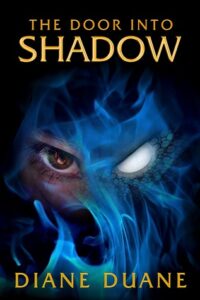 The Door into Shadow, Diane Duane
The Door into Shadow, Diane Duane
While The Door into Shadow continues the overarching plot of getting Freelorn to his throne, the focus turns from Herewiss to Segnbora. Segnbora is a great character, her relationship with the dragons is fascinating, and the overall thrust of the story — of overcoming old trauma to really come into your power, even embracing the old trauma because it made you who you are — chimes with me quite well.
The only problem is, Segnbora’s character is built on that trauma, around her inability to open up — to magic, to people, to anything. The whole thing relies on her overcoming her trauma. Which, because she’s a female character, you can probably guess the origin of. There is something powerful here about acceptance and healing, but I could wish her story didn’t just reach for that convenient storyline. Particularly when it’s otherwise good about people living and loving outside the box, and at making that a totally natural part of the world.
I didn’t love any of the characters as much as Herewiss and Sunspark, and something about the structure of the plot didn’t work that well for me either. It felt like a series of pre-ordained episodes, taking Segnbora inexorably toward something she didn’t want to face, “for her own good”. I guess that fits with the way this world works, but it didn’t work for me.
Also, some of the language about the Goddess sometimes tips into being ‘too much’ for me, somehow. The Glasscastle section, however, is brilliant; atmospheric, urgent.

The trauma storyline has struck many people as cliched, but it’s also autobiographical: it’s essentially what happened to Duane herself as a child. In response to people who have criticized Segnbora’s forgiveness of her assailant, the author merely noted that “it worked for [her]”.